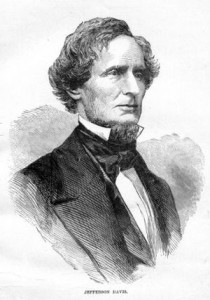 Today Confederate President Jefferson Davis replies to Gen. Robert E. Lee‘s recent letter to him concerning the devastating loss at Gettysburg. Davis expresses confidence in Lee and assures the general that no one is capable of taking his place as commander of the Army of Northern Virginia.
Today Confederate President Jefferson Davis replies to Gen. Robert E. Lee‘s recent letter to him concerning the devastating loss at Gettysburg. Davis expresses confidence in Lee and assures the general that no one is capable of taking his place as commander of the Army of Northern Virginia.
Richmond, Va., August 11, 1863.
General R. E. Lee, Commanding Army of Northern Virginia.
General:
Yours of the 8th instant has been received. I am glad that you concur so entirely with me as to the wants of our country in this trying hour, and am happy to add that, after the first depression consequent upon our disasters in the West, indications have appeared that our people will exhibit that fortitude which we agree in believing is alone needful to secure ultimate success.
It well became Sidney Johnston, when overwhelmed by a senseless clamor, to admit the rule that success is the test of merit, and yet there is nothing which I have found to require a greater effort of patience than to bear the criticisms of the ignorant, who pronounce everything a failure which does not equal their expectations or desires, and can see no good result which is not in the line of their own imaginings. I admit the propriety of your conclusions, that an officer who loses the confidence of his troops should have his position changed, whatever may be his ability; but when I read the sentence, I was not at all prepared for the application you were about to make. Expressions of discontent in the public journals furnish but little evidence of the sentiment of an army. I wish it were otherwise, even though all the abuse of myself should be accepted as the results of honest observation. Were you capable of stooping to it, you could easily surround yourself with those who would fill the press with your laudations and seek to exalt you for what you have not done, rather than detract from the achievements which will make you and your army the subject of history, and object of the world’s admiration for generations to come.
I am truly sorry to know that you still feel the effects of the illness you suffered last spring, and can readily understand the embarrassments you experience in using the eyes of others, having been so much accustomed to make your own reconnoissances (sic). Practice will, however, do much to relieve that embarrassment, and the minute knowledge of the country which you have acquired will render you less dependent for topographical information.
But suppose, my dear friend, that I were to admit, with all their implications, the points which you present, where am I to find that new commander who is to possess the greater ability which you believe to be required? I do not doubt the readiness with which you would give way to one who could accomplish all that you have wished, and you will do me the justice to believe that, if Providence should kindly offer such a person for our use, I would not hesitate to avail of his services.
My sight is not sufficiently penetrating to discover such hidden merit, if it exists, and I have but used to you the language of sober earnestness, when I have impressed upon you the propriety of avoiding all unnecessary exposure to danger, because I felt your country could not bear to lose you. To ask me to substitute you by someone in my judgment more fit to command, or who would possess more of the confidence of the army, or of reflecting men in the country, is to demand an impossibility.
It only remains for me to hope that you will take all possible care of yourself, that your health and strength may be entirely restored, and that the Lord will preserve you for the important duties devolved upon you in the struggle of our suffering country for the independence of which we have engaged in war to maintain.
As ever, very respectfully and truly, (Signed)
Jefferson Davis.
Meanwhile, far from the battlefields of war the growing Christian Sabbatarian movement, led by Ellen G. and James White (wife and husband) continues to find ready reception among some Baptists of the North.
Baptists are mentioned several times in today’s edition of the White’s periodical, the Advent Review and Sabbath Herald. One reference, written by Sabbatarian J. H. Waggoner from Ohio, notes:
I have spoken four times in the Baptist meeting-house, and have received very kind treatment from the pastor and members of that church.
Why are some Baptists open to a movement that rejects Sunday worship in favor of Saturday worship? From their beginnings, Baptists focused on scriptural authority and interpretation. The Whites’ argument that the biblical day of worship is Saturday is a solid, literal reading of the scriptural text, and thus appealing to some. Most Baptists, however, are not persuaded to discard the long-standing Christian tradition of Sunday worship, reconciling the extra-biblical practice with the argument that Jesus’ resurrection on a Sunday superseded the Hebraic, Old Testament practice of Saturday worship. Nonetheless, the Baptist faith — based on freedom of conscience, voluntary faith and congregational autonomy — freely allows Baptist individuals and congregations to embrace Sabbatarian views, if they are so persuaded.
Sources: Jefferson Davis to Robert E. Lee letter, August 11, 1863 (link); J. H. Waggoner, “Labors in Ohio” and N. E. Cornell, “Note from the Michigan Tent”, Advent Review and Sabbath Herald, Vol. 22 No 11, August 11, 1863 (link); Ellen G. White (link) and (link)


